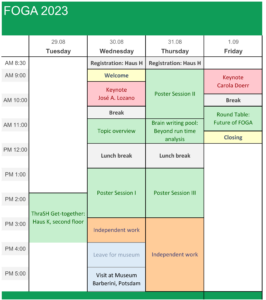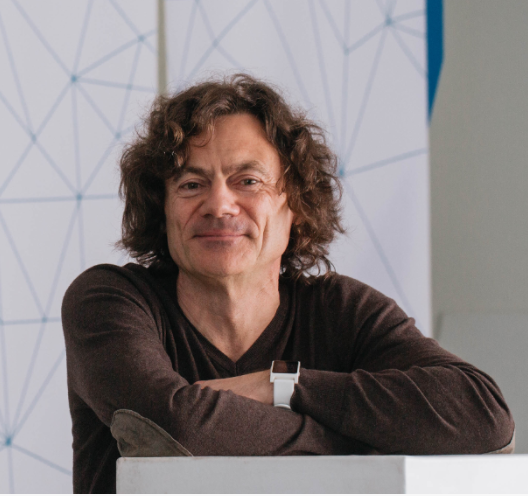
Lunch tickets for the local mensa (student canteen) will be provided.
Results of FOGA creative writing session
There will be a visit to Museum Barberini in Potsdam downtown on the first day, including a guided tour. Dinner is not included; downtown are many options to choose from.
Invited Talks

Speaker: Carola Doerr
Title: Bridging Theory and Practice in Evolutionary Computation?
Abstract: Evolutionary computation methods are successfully applied to solve a broad range of industrial and academic optimization problems. Most of these problems are far too complex to be analyzed analytically. Runtime analysis, a central topic in the theory of evolutionary computation, is therefore typically restricted to structurally simple artificial optimization tasks. In this presentation, I will discuss various ways in which we can nevertheless “bridge the gap” between theory and practice in evolutionary computation.

Speaker: José A. Lozano
Title: Analyzing the Fourier Representation of Permutation-Based Combinatorial Optimization Problems
Abstract: Combinatorial optimization seeks to uncover efficient algorithms for solving complex problem instances. While achieving the ultimate goal of universal optimization remains a challenge, progress in this direction yields valuable insights for the field. A critical initial step involves taxonomizing problems and instances through a common representation. In this presentation, we employ the Fourier transform framework to investigate permutation-based combinatorial optimization problems. Specifically, we examine the Fourier coefficients of various special cases of the quadratic assignment problem, revealing their inherent characteristics. Leveraging this decomposition, we explore the transition of the linear ordering problem from being tractable (P) to becoming NP-hard, shedding light on the intricacies of this transformation. Through this analysis, we advance our understanding of permutation-based combinatorial optimization, paving the way for potential algorithmic breakthroughs.
Contributed Papers
The two papers marked with (*) are nominated for a best paper award. All papers can be obtained from the ACM DL.
Session 1
Rigorous Runtime Analysis of Diversity Optimization with GSEMO on OneMinMax Denis Antipov, Aneta Neumann, and Frank Neumann (The University of Adelaide)
Curing ill-Conditionality via Representation-Agnostic Distance-Driven Perturbations Kirill Antonov, Anna V. Kononova, Thomas Bäck, and Niki van Stein (Leiden University)
Finding Antimagic Labelings of Trees by Evolutionary Search Luke Branson and Andrew M. Sutton (University of Minnesota Duluth) and Xiankun Yan (The University of Adelaide)
Weighted Mutation of Connections To Mitigate Search Space Limitations in Cartesian Genetic Programming Henning Cui and David Pätzel (University of Augsburg); Andreas Margraf (Fraunhofer Institute for Casting, Composite and Processing Technology IGCV); and Jörg Hähner (University of Augsburg)
Runtime Analysis of a Co-Evolutionary Algorithm: Overcoming Negative Drift in Maximin-Optimisation Mario Alejandro Hevia Fajardo, Per Kristian Lehre, and Shishen Lin (University of Birmingham)
Session 2
(*) Using Automated Algorithm Configuration for Parameter Control Deyao Chen (University of St Andrews); Maxim Buzdalov (Aberystwyth University); Carola Doerr (Sorbonne University, CNRS, LIP6); and Nguyen Dang (University of St Andrews)
General Boolean Function Benchmark Suite Roman Kalkreuth (Sorbonne University); Zdenek Vasicek and Jakub Husa (Brno University of Technology); and Diederick Vermetten, Furong Ye, and Thomas Bäck (Leiden University)
Neural Networks as Black-Box Benchmark Functions Optimized for Exploratory Landscape Features Raphael Patrick Prager (University of Münster); Konstantin Dietrich (TU Dresden, ScaDS.AI); Lennart Schneider (LMU Munich, MCML); Lennart Schäpermeier (TU Dresden, ScaDS.AI); Bernd Bischl (LMU Munich, MCML); Pascal Kerschke (TU Dresden, ScaDS.AI); Heike Trautmann (University of Münster, University of Twente); and Olaf Mersmann (TH Köln – University of Applied Sciences)
Partition Crossover can Linearize Local Optima Lattices of k-bounded Pseudo-Boolean Functions Darrell Whitley (Colorado State University), Gabriela Ochoa (Stirling University), and Francisco Chicano (University of Málaga)
Session 3
(*) First Steps Towards a Runtime Analysis of Neuroevolution Paul Fischer (Technical University of Denmark), Emil Lundt Larsen (Abzu ApS), and Carsten Witt (Technical University of Denmark)
Fixed-Parameter Tractability of the (1+1) Evolutionary Algorithm on Random Planted Vertex Covers Jack Kearney (University of Minnesota Duluth), Frank Neumann (The University of Adelaide), and Andrew M. Sutton (University of Minnesota Duluth)
Self-adaptation Can Improve the Noise-tolerance of Evolutionary Algorithms Per Kristian Lehre and Xiaoyu Qin (University of Birmingham)
Convergence Properties of the (𝜇/𝜇_𝐼 , 𝜆)-ES on the Rastrigin Function Amir Omeradzic and Hans-Georg Beyer (Vorarlberg University of Applied Sciences)
First Complexity Results for Evolutionary Knowledge Transfer Eric O. Scott (The MITRE Corporation) and Kenneth A. De Jong (George Mason University)